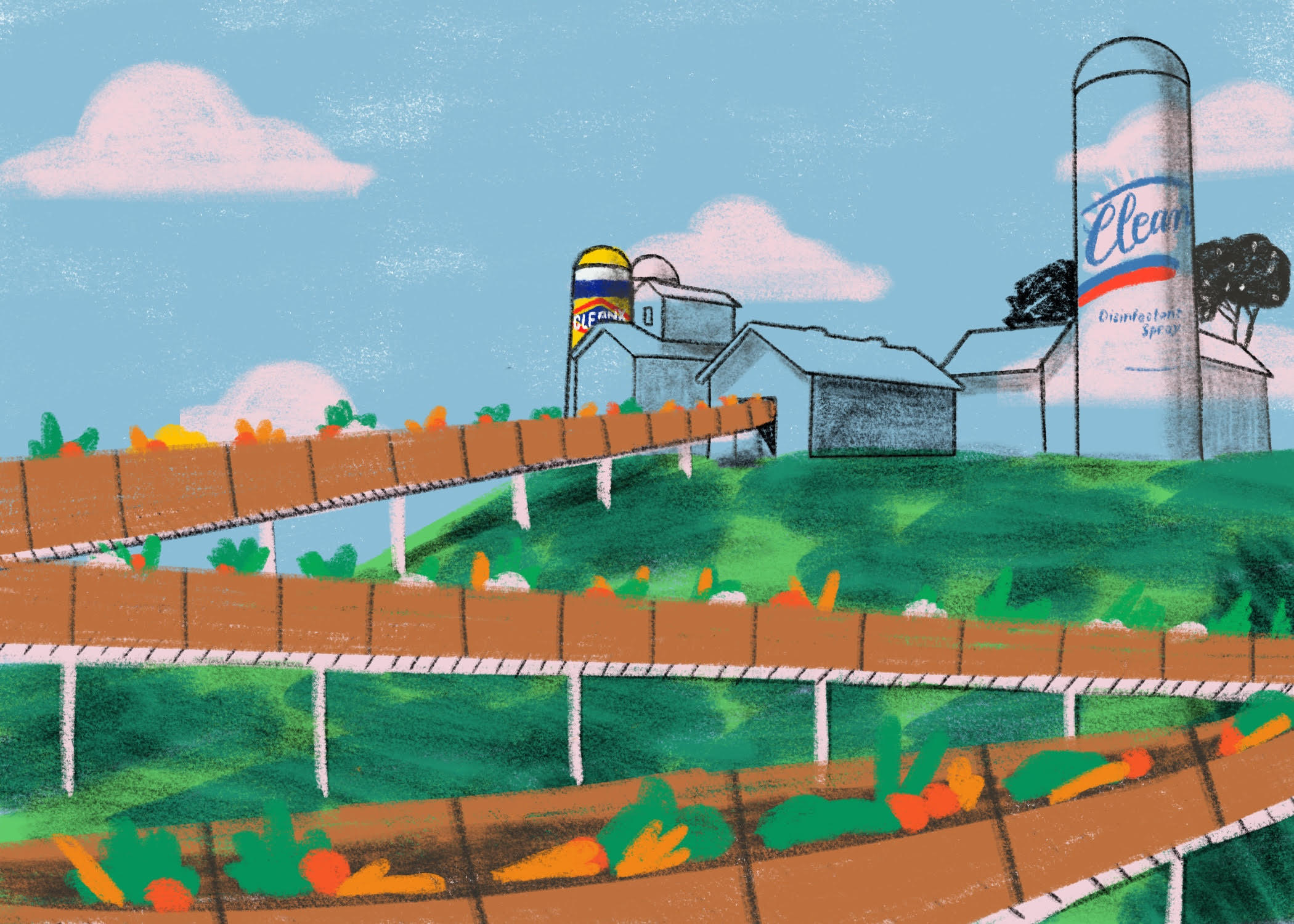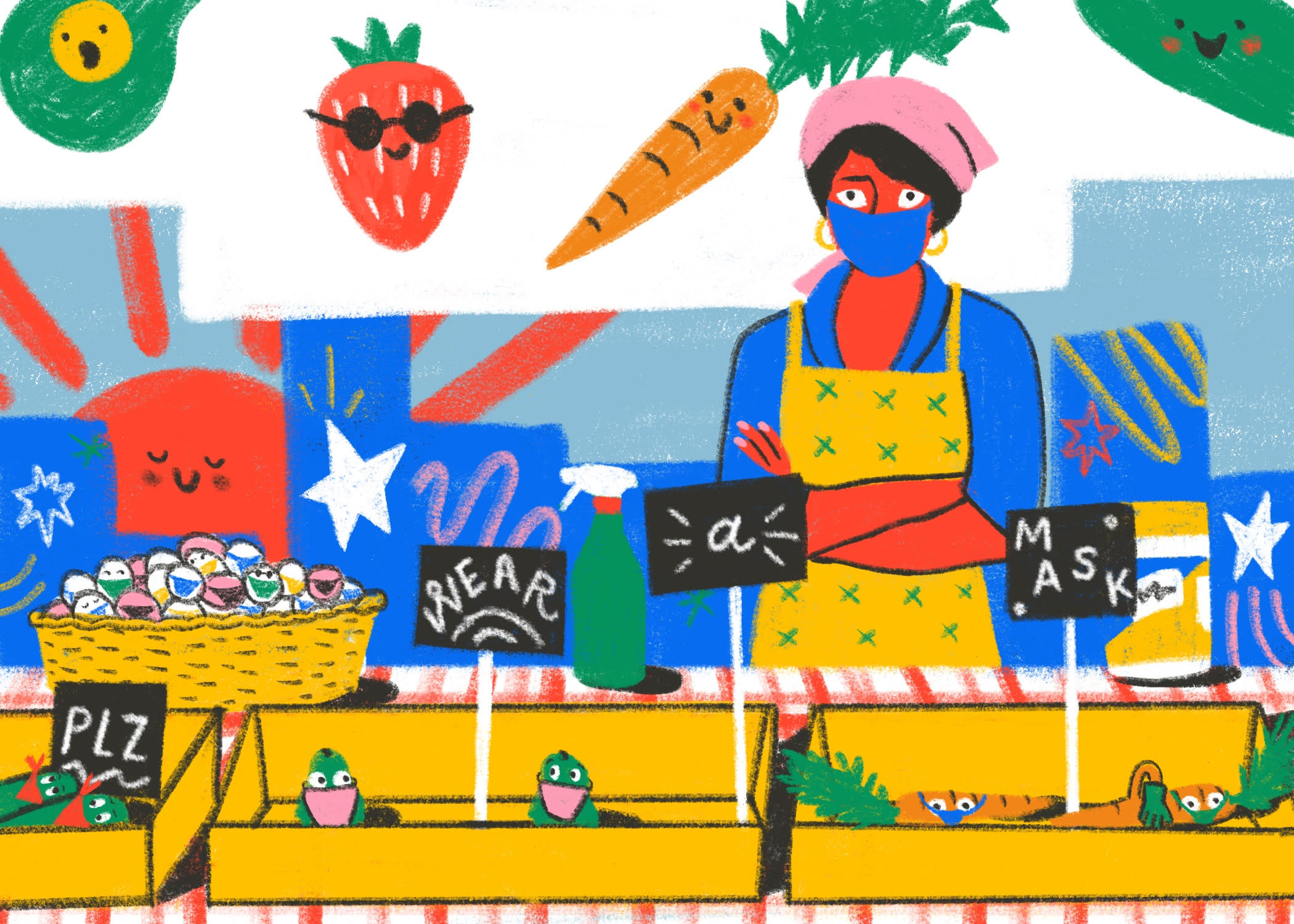May marks the time of year when farmers all over the South Side pack up and sell fresh produce and other products beneath large tents at bustling markets throughout the city. But, of course, this year is different. Due to the COVID-19 public health crisis, farmers have had to rapidly adjust their operations to adapt to a sudden new world of virtual and socially distanced markets.
Stef Funk is the program coordinator at Plant Chicago, a nonprofit that provides public programming on sustainability and circular economies in Back of the Yards. Since 2015, Plant Chicago has run a monthly farmers’ market that sells produce from farms on the South Side, as well as premade foodstuffs and handicrafts. The market, which drew regular crowds, has moved online since the beginning of Governor Pritzker’s stay-at-home order, with customers ordering online and purchases available for curbside pickup or home delivery.
“Markets for so long have sought out to be community spaces where people can learn and gather and enrich their lives. And now all of a sudden it’s like a grocery store where you [wait in single] file. It’s just a really sharp turn,” Funk said.
Starting June 6, Plant Chicago will hold a soft opening of a retail space at their base at 4459 S. Marshfield Avenue. Funk said that Plant Chicago hopes to open a smaller-scale, in-person market with social-distancing rules in effect this summer. For now the retail space will provide greater access to fresh food for Link card users and people living close by. Until recently, Link cards could not be used online. That will change for most grocery shopping starting June 2, as Pritzker announced May 20 that all existing Link card users will now be able to purchase groceries online. However, the program is still not viable for online markets or small farmers, as retailers must meet multiple requirements, many of which pose barriers for entry into the program.
In the interest of preventing crowds and contamination risks, non-Link customers are encouraged to continue using the virtual market. The retail space will be open from 11am–3pm on Saturdays, from June through September, and masks must be worn by all visitors and vendors.
However, while Chicago farms may not reap the benefit of large crowds at farmers’ markets this year, Funk said that farmers are nonetheless experiencing a significant increase in customers. She attributes the surprising surge to the public’s desire to have more control over the sources of their food, as the experience of shopping at crowded grocery stores has become increasingly nerve wracking.
Stephanie Dunn is the owner of Star Farm Chicago, a Back of the Yards–based nonprofit farm that offers a community supported agriculture program (CSA) and a raised-bed installation service, and provides training and horticultural therapy for women, youth, and people with disabilities at the farm. Star Farm is one of the Plant Chicago farmers’ market vendors that has seen an uptick in business.
While Star Farm has had to put its community services on hold due to the pandemic, Dunn said that the farm has received a sizable increase in CSA orders, so much so that she is now planning to scale up operations by purchasing an additional cooler and vehicle for deliveries. Star Farm has also received more requests for raised bed installation, which Dunn attributes to the pandemic causing an increase in peoples’ desire to grow their own food.
Small farms have had to rapidly adjust their business models to the digital landscape of online markets. Before the pandemic hit, Closed Loop Farms sold a hundred percent of its produce to restaurants throughout the city. Once restaurants started to shut down, Closed Loop’s owner Adam Pollack had to rapidly change his business model by building a website and new customer base in order to sell to the public.
Sanitization practices have also changed operations, and the indoor farm space is sanitized regularly by workers wearing PPE.
Pollack said that while he wanted to eventually branch out and sell to individual customers, he had no idea it would happen so quickly. Now that Closed Loop has expanded its business model, Pollack said the challenge will be reintegrating it with the old model once restaurants reopen.
“We don’t know how long [it will be] until restaurants reopen. We don’t want restaurants to reopen and not be able to service them,” Pollack said.

Closed Loop Farms is also located in Back of the Yards, at the Plant (not to be confused with the nonprofit Plant Chicago, one of its former tenants), and has both an indoor farm that grows microgreens and an outdoor farm that grows edible flowers and produce. The Plant is a closed-loop waste facility and home to multiple small food businesses, including Whiner Beer, Arize Kombucha, Tuanis Chocolate, and others. While Closed Loop does not offer a CSA program, Pollack built his website to serve as an online market for all of the businesses at the Plant, and customers can order produce and products online and receive a no-contact delivery.
[Get the Weekly in your mailbox. Subscribe to the print edition today.]
Among the many social and economic disparities the COVID-19 pandemic has exposed are the deep cracks in the food system and the inequitable access to fresh and healthy foods for low-income households. Many farms are responding to the problem of food inequity through increased donation programs.
The Urban Growers Collective is a Bridgeport-based nonprofit working to create community-based food systems and increase access to fresh and healthy foods, with several farm sites on the Southeast Side. According to cofounder Erika Allen, production has massively increased at their sites, in large part to provide more emergency food for those impacted by food access challenges.
“[We are working on] making the highest quality produce accessible to the communities impacted overwhelmingly by lack of nutrition. Of course with COVID-19, having a strong immune system is clearly something that is good for everybody, but especially for communities that are impacted by trauma and violence on a pretty consistent basis. [Trauma and violence] impact general health outcomes, but especially the immune system and stress response,” Allen explained.
The Urban Growers Collective currently donates 250 boxes to food-insecure families each week, and customers can purchase donation boxes through the farm’s website. Allen hopes to scale up operations to increase donation boxes and distribution.
Star Farm has a similar donation model. Customers can donate to subsidize part of the cost of a CSA share for a low-income family and Star Farm matches the price of the donation to complete the full cost of a full season share. The farm is also working with the Experimental Station, home of the 61st St. Farmers Market, to offer a subsidized “Market Box” to Black, low-income, and Woodlawn-area residents. While Closed Loop Farms does not have a CSA program, Pollack said that extra produce has been going to the Port Ministries and the Casa Catalina food pantry, which is located around the corner from the Plant.
“We have so many microgreens that we were growing for restaurants. I’m sure there are a lot of farms that are in this position; we’ve definitely been making more donations than usual,” Pollack said.
Stef Funk expressed hope that the surge in local food interest will continue once the pandemic is no longer a threat.
“I do think the world will always look different after this,” she said. “Now people are realizing ‘I want things to be close and local and safe and I want to know exactly where things are coming from.’ So hopefully this sticks afterwards. Hopefully people realize this is the better way to do things.”
Lucia Whalen is a writer and multimedia journalist focused on health, science, and the environment; she is also a cofounder of Trashy Magazine. She last wrote about General Iron moving to the Southeast Side for the Weekly. You can find her at @whalenlucia.




Two things – To clarify, all SNAP recipients have Link Cards but not all Link Cards belong to SNAP participants. All existing Link Card users will NOT be able to purchase groceries online, but “all Link customers will be alerted when they can use their card to make food orders online.
Secondly, and more importantly, SNAP participants can now use their Link Cards to purchase groceries online, but only two retailers have been approved by USDA to accept online SNAP payments, Amazon and Walmart.